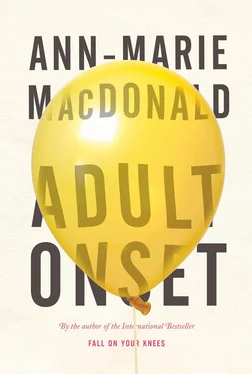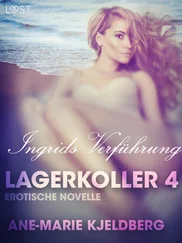She toyed with the idea of getting anger management counselling when Matthew was a baby. It was around Christmas. She was pulling out of the parking lot of a government building in suburbia where she had gone ballistic on a civil servant who informed her, after a long wait with her baby, that she would have to return with his adoption papers in order to show that she was eligible to apply for a health card on his behalf. She had taken her portable infant car seat with her infant in it and stormed out, registering split-second interruptions in her consciousness as she rode the elevator down. She got in her car and, as she pulled up to the parking booth, glanced out of habit in the rear-view mirror, only to see that there was no infant car seat snapped into the infant car seat base, and no infant. She had left him, securely buckled, on the ground, next to her parking spot. On the yellow line. She had driven all of thirty feet away. It had been all of fifteen seconds. More than enough time for hell to have opened up and swallowed him. But he was safe. She vowed to get help. Then Maggie came along and she just got too busy again.
She never knows when it might strike. The rage. And when it does, she loses her grip on herself — literally. At times, she could swear she sees another self — shiny black phantom, faceless, as though clad in a bodysuit — leaping out of her, pulling the rest of her in its wake. Over the edge.
If someone had injected her with a potion labelled Mr. Hyde , it would make sense, for the rage always feels like it comes out of nowhere. It is only afterwards that she recognizes that whole sections of her brain have been shut down, whole circuit boards. For example, she loses language. Gone. It is akin to what used to happen to her in the bad old days when a strip of world would cease to exist in her visual field, just as though it had never been. Or, equally disconcerting, when a giant yellow orb would appear right in front of her, blocking her view — it was like trying to see around a big yellow sun. “Incomplete classic migraine,” said the ophthalmologist. “Panic attack,” said Dr. Judy, and asked if she would like to “see someone.” But Mary Rose knew they were really evil spells — she needed a sorcerer, not a shrink.
Those times are like dreams or the pain of surgery however — they get filed separately. She has undone many evil spells since becoming a mother — even so, there is still a spinning wheel somewhere in the kingdom and she never knows when she might prick her finger …
There is nothing wrong with her life. She has a loving partner and two healthy, beautiful children. She has put money into education funds, she has put photos into albums. She can make pancakes without a recipe, she knows where the IKEA Allen key is, and has memorized the international laundry symbols — she has not Polaroided her shoes, she has her inner Martha Stewart in check. That is a slippery slope: you start making your own ricotta, next thing you know you’re in jail.
•
That spring they place a stone on his grave. They bring the children. He says to his little one, “Stand close to Mummy, Mister. That’s right.”
Then he takes a photograph of his wife, and children.
•
She wakes at three a.m., curled cold on the La-Z-Boy couch, and goes calmly up to bed.
•
Other Mary Rose never became Mary-Rose-Who-Died, because she was born dead. This blurred the notion that she had ever been alive and potentially someone. Not baptized. Therefore not fully named. As if her name had been laid over her like a sheet that kept slipping off. Nothing sticks to a dead baby.
Journey to Otherwhere
Her father was showing her a brochure, St. Gilda’s Academy for Girls is among the top private schools in the country. Set amidst the beautiful Laurentian Mountains …
When she found her voice, she said, “It makes absolutely no sense, why would you send me to a Catholic school, we’re supposed to be atheists.”
“You won’t be required to attend church—”
“If I’m anything, I’m Hindu. What if I decide to become devout?”
She saw him almost laugh and felt a glimmer of hope, but he continued. “Kitty, it’s my fault, I’ve deprived you of a normal life—”
“I don’t want a normal life.”
He shook his head. “Aunt Fiona’s right—”
“She’s not my aunt.” Next thing she knew, Dad would be telling her to call that woman Mom.
He looked sad now. “It’s not fair to you, Kitty, I’ve tried to turn you into a little version of myself—”
“What’s wrong with that?”
“Nothing, if that’s what you choose later on, but so far, whether you realize it or not, you haven’t had any choice—”
“Then let me choose! I choose you, I don’t choose that school!”
He regarded her sadly. “Kitty, have you ever heard the expression, ‘I must be cruel to be kind’?”
“It sounds like something grown-ups say when they want to get their way and have their kid feel sorry for them at the same time.”
He shook his head. “I’m not going to win an argument with you.” His smile was wistful. “You’re like your mother.”
She could not explain why this made her so angry that for a split second all she saw was a flash of black.
He continued. “You can either pack your things yourself or Ravi will send them along later.”
At the mention of Ravi, something terrible happened. Kitty started to cry. Kitty McRae never cried. It broke over her with the inexorability of one of the floods she had witnessed.
He winced and rose from the leather armchair. “I’m sorry, sweetie pie. I’m not much good to you sometimes.” She balled her fists against her eyes until the pain doused her tears, then called after his retreating back, “You wouldn’t send me away if I were a boy!”
Her father paused but did not turn. His shoulders sagged and she saw a shred of silver, no larger than a hanky, flee his side as he went out the door, leaving her in the room that had always been the safest place in the whole wide world. Until ten minutes ago.
I’m a Baby. I Can Drive Your Car. (And Maybe You’ll Love Me.)
It is sleeting. The kitchen windows are streaky grey. On the craft table, she checks out Maggie’s masterpiece. The page is now covered with her “witing.” Is it possible, she wonders, that Maggie can actually wead what she has witten? Is it a form of infantile literacy that she will unlearn as she grows older? Perhaps the child is an amanuensis, channelling a chronicle from another world, secrets of the universe from the nibs of babes, if only we had the means to translate … a cosmic Rosetta stone. She ought to jot that idea down for the third in the trilogy. But she remains motionless before the page, her gaze semi-focused … and it comes true: there is a secret message. It shimmers beneath the veil of colour, surfaces, and Mary Rose is able to read it: NOTICE OF SUSPENSION OF HOME DELIVERY.
Maggie is in her high chair, redistributing her oatmeal around her Bunnykins bowl.
“Maggie, this is beautiful work, but you took Mumma’s piece of paper from the table.”
Maggie replies, “Bunny is packing the car.”
“Maggie—”
I’m not angry. She is a baby, and she has made something beautiful . “Is it for Mummy, for when she gets home?” Maggie shakes her head with a sly smile. Mary Rose smiles back because she knows her patience with the boots and the walking to school yesterday and her phenomenal forbearance with the form just now are about to be rewarded. Maggie’s masterpiece has been lovingly rendered for her: Mumma .
“Candies,” says Maggie.
Mary Rose feels the smile curdle on her lips. “That’s so nice, Maggie, Candace will be so happy.”
Читать дальше












